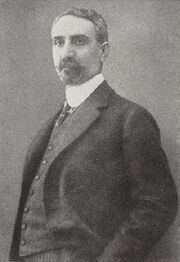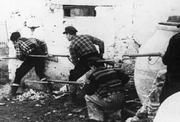| Kingdom of Bulgaria Царство България, Tsarstvo Bǎlgariya (Bulgarian) Timeline: German Heritage | ||||||
|---|---|---|---|---|---|---|
|
||||||
| Anthem: Shumi Maritsa Anthem of His Majesty the Tsar (Royal) |
||||||
| Capital | Sofia | |||||
| Official languages | Bulgarian | |||||
| Religion | Bulgarian Orthodox | |||||
| Demonym | Bulgarian | |||||
| Government | Parliamentary Constitutional monarchy | |||||
| - | Monarch | Simeon II | ||||
| - | Chairman of the Council of Ministers | Boyko Borisov | ||||
| - | Chairperson of the National Assembly | Tsetska Tsacheva | ||||
| Legislature | National Assembly | |||||
| Population | ||||||
| - | August 2018 estimate | 10.5 million | ||||
| Currency | Bulgarian lev (BGN) |
|||||
| Time zone | EET (UTCUTC+2) | |||||
| Date formats | dd.mm.yyyy | |||||
| Drives on the | right | |||||
| Internet TLD | .bg | |||||
Bulgaria, officially the Kingdom of Bulgaria (Bulgarian:Царство България, Tsarstvo Bǎlgariya), is a nation located in South-Eastern Europe. It is bordered by Romania and Serbia to the north, Albania to the East, Greece and Turkey to the south, and is bound by the Black Sea to the east. The capital and largest city is Sofia; other major cities are Skopje, Varna and Thessaloniki.
The Russo-Turkish War of 1877–78 resulted in the formation of the current Third Bulgarian State. Many ethnic Bulgarian populations were left outside its borders, which led to several conflicts with its neighbours and earned it the nickname “the Balkan Prussia”. After World War I, Bulgaria gained the Serbian and Greek territories of Macedonia and parts of Southern Romania. After the Third Balkan War, Bulgaria finally confirmed their controlling position in the Balkan Peninsula. Bulgaria benefited from the Occupation of Romania and the EEU, creating the strongest economy in the Balkans.
Today, Bulgaria is part of the European Community, the Council of Europe and the League of United Nations.
History[]

Aleksandar Pavlov Malinov, Prime Minister 1908-11, 1918-1930
Bulgaria’s victory as part of the Central Powers in World War I awarded it masses of Greco-Serbian land in the region of Macedonia. A large amount of the war reparations of Romania, Greece and Serbia was given to Bulgaria, which was invested in the industrialisation of the key Bulgarian cities. Aleksandar Malinov was appointed as a prime minister, and began to gradually reform Bulgaria. German Investment and the sale of Romanian Oil boosted Bulgarian industry, causing an decrease in Bulgaria’s agricultural base of the economy. To split the pro-republican Agrarian People’s Union (BZNS), Malinov also appointed moderate members of the ZS-AS as ministers of education and agriculture. These moderate members were expelled from the party and formed the pro-nationalist Party for Agrarian Reform, combining the ZS-AS’s agricultural policies (though moderated) with pro-monarchist nationalism, which was popular in Bulgaria.
When combined with the Agrarian People’s Union’s ideological ambiguity and the industrialisation of Bulgaria, Malinov’s plan to split the powerful Agrarian movement succeeded. The reformist platform of the government and the Bulgarian People’s newfound royalism and nationalism also alienated the communists’ popular support, though they still had a following in impoverished urban areas.
After Nikola Mushanov was overthrown by the militaristic Zveno Movement led by Kimon Georgiev, who abolished political parties and trade unions and introduced a corporatist system. With permission from his father Tsar Ferdinand (who was in his mid-70s), the-then Prince Boris declared a regency, staged a counter-coup and assumed control of the country. The political process was controlled by the Regent, but a form of parliamentary rule was re-introduced, without the restoration of the political parties. Prince Boris would lead Bulgaria through what would become one of its hardest times - the Third Balkan War.
The fall of George I Obrenović in 1932 led to the rise of a conservative, nationalist government under King Alexander I in Serbia. Alexander’s government rapidly rearmed in preparation of a war to reclaim Kosovo and Vardar Macedonia from Albania and Bulgaria, respectively. In union with Greece, the two nations declared war on Bulgaria, Albania and Montenegro in 1936, starting the Third Balkan War. Serbia and Greece quickly occupied Albania and Montenegro, and moved their attention to the Front with Bulgaria. With the Serbs pushing from the North and the Greeks advancing from the south, Bulgaria forces in Macedonia were surprised, losing measures of land. After these initial gains however, the Serbo-Greek advance stalled, turning the front into a stalemate. Romania was kept out of the war due to the First Bucharest Agreement, in which Germany promised to support Romania in the upcoming invasion of Transylvania and give Romania an increased level of political autonomy if Romania stayed out of the war against Bulgaria.

A local Greek militia prepare to attack Bulgarian forces during the Battle of Thessaloniki
Serbian seprearists in Hungarian-Held Vojvodina declared independence in July 1937, while Romania intervened in Transylvania after the suppression of the Romanians living there. This Serbian-backed rebellion ultimately led to the demise of Serbia by drawing valuable Serbian troops from the front in Bulgaria. With the arrival of 2,000 German Soldiers in August 1937, the Bulgarians began a massive counterattack against weak points in the Serbian Army and in Greek Macedonia. As the war began to turn in favour of Bulgaria, mutinies in Greece broke out, leading to a crucial Bulgarian victory at the Battle of Thessaloniki. The Bulgarians quickly advanced through Greece, causing Greek capitulation in October 1937. Meanwhile, the Serbian revolt in Hungary had succeeded, freeing up the Serbian troops and creating new conscripts. As Autumn and Winter approached, the front again became stable, with either side unable to make any real gains. As mid-Spring dawned, the Bulgarians executed Operation Ferdinand as a part of the larger Spring Offensive. Various Bulgarian victories led to the Serbian surrender on the 21st of May 1938, officially ending the Third Balkan War after two years.
War-torn and with its position in the Balkans confirmed, Bulgaria maintained official neutrality in World War II, though it still greatly supported Germany through resources and arms. Largely down to Prince Boris’ experience in the Balkan Wars and World War I, he was reluctant to enter Bulgarians into another bloody conflict and even denied a sponsored regiment made up of Bulgarian Volunteers. Boris was also worried about how the communists would respond to a Bulgarian entry into the war with the Commintern.
Economy[]
Politics[]
=Prime Minister[]
- 1918-1930: Aleksandar Malinov
- 1930-1934: Nikola Mushanov
Political Parties[]
| ||||||||||||||||||||



